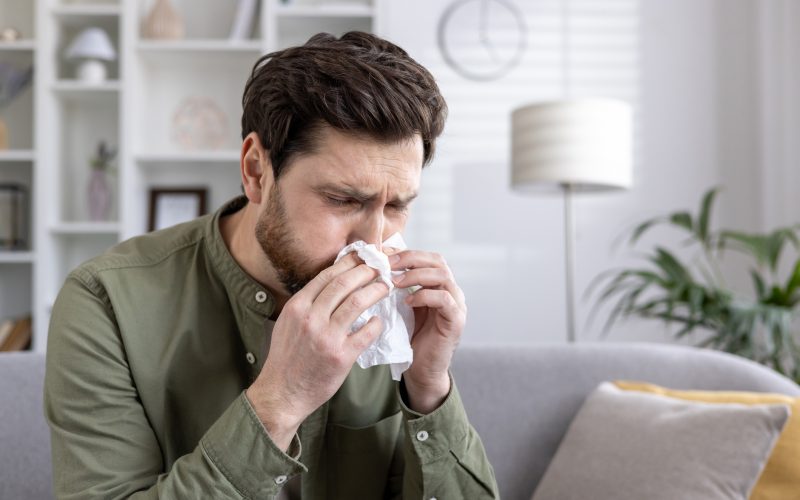**Common Cold: Understanding Symptoms and Treatments**The common cold follows a predictable course, with symptoms typically lasting between seven to ten days, and sometimes up to two weeks.During this period, the body requires time and rest to heal, but there are many treatments that can alleviate symptoms and expedite recovery.Here, we detail several options.A typical cold usually progresses through four stages:1.**Incubation**: The time interval between exposure to the cold virus and the onset of symptoms is known as the incubation period, which usually lasts between one and three days. 2.**Early Symptoms**: The initial symptoms of a cold may include a runny nose, sneezing, or a scratchy throat.This stage lasts one to two days. 3.**Acute Phase**: During this phase, symptoms are at their most intense and may include nasal congestion, cough, muscle aches, and runny or postnasal drip.This phase typically lasts between two and three days. 4.**Recovery**: Symptoms begin to improve from the seventh day.Some individuals fully recover within seven to ten days, while others may experience persistent coughing for up to two weeks or more.Although rest and time are essential for the body to overcome a cold, there are numerous natural remedies and over-the-counter medications that can alleviate symptoms and promote healing.**1.Sleep** When you feel tired and weak, it is important to listen to your body and prioritize rest.Sleep is one of the most effective ways to help your body recover.During sleep, the immune system produces cytokines, a type of cell that actively fights viruses, including those responsible for colds.To reduce congestion, avoid lying completely flat, and instead try to elevate your head on a high pillow.**2.Hydration** Drinking clear liquids, such as water, chicken broth, or warm water with lemon, helps to thin mucus in the sinuses, making it easier to expel.Herbal teas can soothe persistent coughs, and ice cubes held in the mouth can relieve throat pain.Although dehydration is not a common issue during colds, increasing fluid intake has been shown to prevent the worsening of symptoms such as fatigue or headaches.**3.Vitamin C** Vitamin C is perhaps one of the most well-known supplements for preventing and treating colds.However, studies have shown that this vitamin does not directly prevent colds.The National Institutes of Health emphasizes that taking vitamin C can reduce the duration of a cold, but to benefit from this effect, it should be consumed regularly before symptoms appear, not after you’re already sick.The recommended dosage is about 200 mg per day.Daily consumption of fruits and vegetables rich in vitamin C, such as oranges, kiwis, or bell peppers, can help maintain a strong immune system.However, it’s important to note that high doses of vitamin C (up to 2000 mg per day) can cause side effects, such as diarrhea or abdominal discomfort.**4.Vitamin D** Colds are more common in the fall and winter months when exposure to sunlight is reduced, leading to decreased vitamin D levels.Supplementing with this nutrient supports healing and reduces the severity of cold symptoms.A study that examined the effects of vitamin D on colds demonstrated that taking 1000 IU of vitamin D daily for four weeks, followed by 400 IU daily for eight weeks, resulted in a 15% reduction in symptom severity and a 36% decrease in the duration of the cold.**5.Zinc** Zinc is one of the most studied supplements for colds.Although research has yielded mixed results, a 2017 study showed that zinc can reduce the duration of a cold by approximately 33%.This means that a cold may last two to three days less if you start taking zinc supplements at the first signs of symptoms.However, the doses used in these studies are much higher than the recommended daily amount, ranging from 80 to 92 mg per day.High doses are not dangerous for most people but can interact with other medications, such as antibiotics or diuretics, affecting their efficacy.Therefore, it is advisable to consult a doctor before starting long-term supplementation.Zinc is available in the form of pills, tablets, or syrups and can be taken as soon as the first symptoms appear.Additionally, zinc can reduce the duration of a cold and may also alleviate the severity of symptoms like nasal congestion and cough.**6.Honey** Honey has antiviral and antibacterial properties and can help thin mucus, soothing throat pain and reducing cough.Research has shown that honey may be even more effective than over-the-counter cough syrups.If your cough interrupts your sleep, try adding a teaspoon of honey to a cup of herbal tea or warm water for a calming effect.**7.Echinacea** Echinacea is a plant that has been used for centuries to strengthen the immune system and prevent respiratory infections, including colds.Current research on the effectiveness of echinacea in preventing colds is mixed, but a 2019 study revealed that it might slightly reduce the risk of developing a cold.However, the benefits are modest, and effects may vary depending on the specific composition of the plants used, which depend on the soil and environment in which they were grown.Echinacea is available in various forms, including teas, tablets, and tinctures.Some individuals have reported side effects such as nausea or diarrhea after using this plant, so it is wise to proceed with caution, especially if you are taking other medications.In general, echinacea may provide immune support but does not guarantee a cure for colds.**8.Beetroot** Beetroot, known for its cardiovascular health benefits, may also help reduce cold symptoms.According to a 2019 study, students who drank beetroot juice during periods of intense stress, such as during exam sessions, showed less severe cold symptoms than those who did not consume the juice.Beetroot is rich in nitrates, which increase the production of nitric oxide in the body, a compound that can protect against respiratory infections.This effect is particularly beneficial for individuals with chronic respiratory conditions such as asthma.However, excessive consumption of beetroot should be avoided by those predisposed to kidney stones due to its oxalate content.**9.Saltwater Gargle** Gargling with saltwater is a simple method to temporarily soothe a sore throat.Saltwater helps break down mucus in the back of the throat and reduces inflammation, thus alleviating throat pain.To gargle with saltwater, mix half a teaspoon of sea salt or table salt in 240 ml of warm water and stir until the salt is completely dissolved.Gargle for up to 30 seconds and then spit out the solution.You can repeat this process multiple times a day.**10.Warm Compresses** Warm compresses applied to the face can quickly relieve the pressure and pain caused by sinus congestion.To prepare a warm compress, soak a towel in warm water, wring it out well to remove excess liquid, and place it on your nose, forehead, and cheeks for a few minutes.The heat stimulates blood circulation in the area, reducing pressure and discomfort.**11.Immune-Boosting Foods** Foods rich in antioxidants have anti-inflammatory properties, can shorten the duration of colds, and reduce symptom severity.Some of these foods include:- Fruits high in vitamin C, such as kiwis and citrus fruits (oranges, grapefruits).- Berries (strawberries, blueberries).- Green vegetables (spinach, broccoli, kale).- Seeds and nuts (flaxseeds, walnuts).- High-fiber foods such as black beans, peas, and chickpeas.**12.Using a Humidifier** Humidity levels drop during the cold season, and humidifiers can be particularly beneficial during this time.Dry air can irritate the airways and worsen cold symptoms such as congestion, cough, and sore throat.Using a room humidifier keeps airways hydrated, helping to relieve throat pain and reduce coughing.The optimal humidity level in a home should be between 40% and 60%.This range is considered comfortable for most people and contributes to health by preventing dry skin and airway irritation.Additionally, this humidity level helps reduce the risk of bacteria, mold, and dust mites proliferation, which can occur if humidity is too high.It is important to clean the humidifier before each use to avoid the buildup of bacteria, mold, and spores that could affect air quality.**13.Over-the-Counter Medications** While over-the-counter medications won’t shorten the duration of a cold, they can help manage symptoms and alleviate discomfort.- **Throat lozenges**: Contain local anesthetics that temporarily relieve sore throat pain by numbing the affected area.- **Throat sprays**: Contain soothing or anesthetic agents that are sprayed directly onto the irritated area for quick action.- **Cough lozenges**: Contain cough suppressants like menthol, which temporarily soothe coughs and cool the throat.- **Saline nasal sprays**: Saline solutions help thin mucus and relieve nasal congestion.- **Antihistamines**: Primarily used for allergies, these can alleviate cold symptoms such as runny nose and sneezing.- **Pain relievers (ibuprofen, acetaminophen)**: Help reduce fever, headaches, and muscle pain associated with colds.**When to See a Doctor** While most colds are harmless and resolve on their own, there are certain situations when a doctor’s visit is necessary, such as when you experience:- Difficulty breathing,- Dehydration,- Symptoms lasting more than ten days,- Symptoms that worsen or improve and then return,- Fever lasting more than four days,- Pre-existing conditions (such as asthma) that worsen.**Cold Treatments to Avoid** There are certain treatments that have no effect on simple colds, and others that are unsafe.Treatments to avoid include:- **Antibiotics**: Effective only against bacterial infections, they do not work on the viruses that cause colds.Taking antibiotics for colds will not speed recovery and may contribute to the development of antibiotic resistance, a growing health issue globally.- **Over-the-counter medications containing phenylephrine**: Ineffective for treating nasal congestion and do not work better than a placebo, according to the U.S.Food and Drug Administration.- **Decongestant nasal sprays**: Can cause rebound congestion, worsening symptoms after you stop using them.- **Essential oils**: While considered safe for use in diffusers or vaporizers for aromatherapy, essential oils applied directly to the skin can cause irritation.Moreover, some essential oils can be toxic if ingested, so they should be used with great caution.
What to do to get rid of a cold quicker.13 easy-to-implement tips

